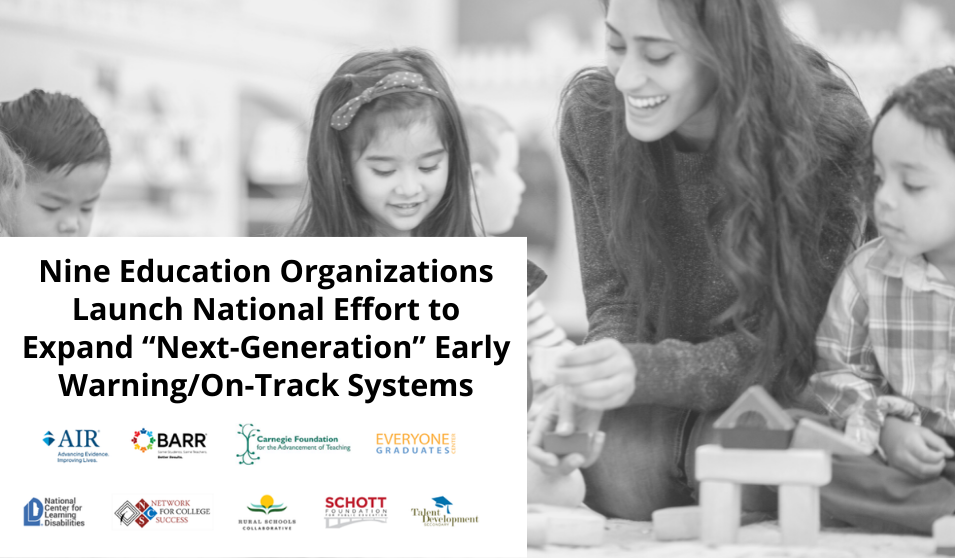Rural Schools Collaborative recently announced the launch our Regional Hubs GRAD Partnership Pilot Networks in partnership with our Northern California Hub and Alabama Black Belt Hub. RSC is thrilled to launch student success systems in 20 rural schools. Read the full announcement here.
NEWS RELEASE
For Immediate Release: July 13, 2022
Contact: Patricia Balana, pbalana1@jhu.edu
Nine Education Organizations Launch National Effort to Expand
“Next-Generation” Early Warning/On-Track Systems
GRAD Partnership to help schools harness predictive data and educator insights to create more effective student support systems and learning environments in wake of pandemic
BALTIMORE – In May, nine education organizations announced the launch of the GRAD Partnership for Student Success, a national effort to implement and scale the use of high-quality on-track/early warning systems across middle and high schools. The new partnership comes as schools and districts look to support the millions of students who are off- track for high school graduation and postsecondary success. These numbers are growing as a result of the pandemic, with many states reporting their first decline in high school graduation rates in over a decade and fewer high school graduates enrolling in college—particularly low-income and minority graduates.
The Partnership represents the culmination of more than a decade of research and efforts to develop and validate early warning/on-track systems. Also known as student success systems, they enable educators to monitor students’ progress using predictive data indicators—such as attendance and course grades—and respond rapidly and effectively when students signal they need additional support.
“We know we can do more when we work together,” said Angela Jerabek, founder and executive director of the BARR Center. “If we can work collectively as organizations that are all doing this work, we know the impact we can have is so much more than what we could have individually.”
“Schools across the country face the urgent task of identifying when students are in need of support and figuring out the resources, supports, and connections they need to thrive in school,” said Robert Balfanz, research professor at the Johns Hopkins University School of Education and director of the Everyone Graduates Center, the managing partner for the effort. “We’re excited to work with schools, districts, and community partners to meet this challenge.”
The Partnership will engage states, districts, schools, and intermediaries across the country to scale next-generation early warning/student success systems. The early focus of the Partnership is to reach districts and schools that were highly impacted by the pandemic and where large numbers of students currently are not graduating high school prepared for postsecondary success. Educators and education leaders who join the Partnership will have access to resources, research, tailored technical assistance, and a community of practice.
“I’m excited that this partnership is available to schools and districts because it’s often difficult to access the expertise and resources needed to do this work well,” said Elizabeth Kirby, superintendent of Cleveland Heights-University Heights City School District, during the partnership’s launch event. “This is a great opportunity to make connections and bring these systems to the next level.”
The last decade saw much progress with on-track, student success work. This next generation of systems will:
Broaden the set of indicators used to monitor student progress and success, to include data on students’ sense of school connectedness, social-emotional wellbeing, and postsecondary enrollment and attainment.
Shift the emphasis from high school graduation to college- and career-readiness.
Use early warning/on-track data to support continuous school-wide improvement.
Work to develop supportive, strength-based mindsets among school personnel.
“The pandemic has created greater needs for more kids—more dynamic, more diverse, and more shifting needs,” Balfanz said during the partnership’s launch event. “We know there was a realm of human need and potential that was not necessarily captured by the first set of systems focused solely on preventing high school dropouts.”
Research from the Chicago Consortium of School Research, Johns Hopkins Everyone Graduates Center, and others have shown that schools can identify which students have high odds of not graduating or are on a path to postsecondary success by monitoring specific data points, including grades and attendance. Schools can then step in with additional support, such as tutoring and counseling, or identify where classroom, grade-level, or schoolwide improvements would result in more students graduating ready for college and career. Over the last decade, a growing number of districts, including Chicago Public Schools and Baltimore City Public Schools, have successfully adopted early warning systems as a tool to keep students on track to graduation and postsecondary success.
The GRAD Partnership, will work hand in glove with the National Partnership for Student Success (NPSS), announced by the Biden administration last week. The NPSS seeks to place an additional 250,000 volunteers and AmeriCorps members serving as tutors, mentors, student success coaches, postsecondary advisors, and integrated student support coordinators in the schools most impacted by the pandemic. Next-generation student success/early warning systems provide schools with the tools to identify which students need what supports when, and where preventive actions are needed. The NPSS then provides schools with the people power needed to provide critical supports at the scale and intensity required.
Schools, states, districts, and community organizations are invited to learn more and join the Partnership by visiting www.gradpartnership.org.
##
The GRAD Partnership for Student Success is a collaborative, national effort to implement and scale the use of high-quality on-track/early warning systems across middle and high schools. The Partnership is a joint effort between nine organizations and institutions: Johns Hopkins Everyone Graduates Center, American Institutes for Research, BARR Center, Carnegie Foundation for the Advancement of Teaching, National Center for Learning Disabilities, Network for College Success at the University of Chicago, Rural Schools Collaborative, Schott Foundation for Public Education, and Talent Development Secondary. Learn more at gradpartnership.org.

